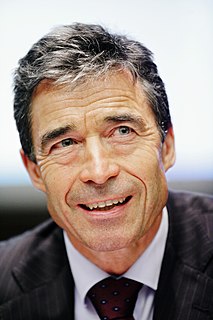A Quote by Anders Fogh Rasmussen
The proliferation of weapons of mass destruction and their means of delivery is a threat to both the Nato allies and Russia.
Related Quotes
The threat of Saddam Hussein with weapons of mass destruction is real, but as I said, it is not new. It has been with us since the end of that war, and particularly in the last 4 years we know after Operation Desert Fox failed to force him to reaccept them, that he has continued to build those weapons. He has had a free hand for 4 years to reconstitute these weapons, allowing the world, during the interval, to lose the focus we had on weapons of mass destruction and the issue of proliferation.
In the area of international security, taking into account that the United States and Russia are the largest nuclear powers: We are ready to jointly work to strengthen the non-proliferation regime for weapons of mass destruction and their means of delivery. We are ready to work together, and much closer than before, on the problem of fighting terrorism, international terrorism, and here we certainly have vast opportunities.
America has shown we are serious about removing the threat of weapons of mass destruction... We now know that Saddam Hussein had the capacity to produce weapons of mass destruction.... We know he had the necessary infrastructure because we found the labs and the dual-use facilities that could be used for these chemical and biological agents. We know that he was developing the delivery systems - ballistic missiles - that had been prohibited by the United Nations.
I believe the proliferation of weapons of mass destruction presents the greatest threat that the world has ever known. We are finding more and more countries who are acquiring technology - not only missile technology - and are developing chemical weapons and biological weapons capabilities to be used in theater and also on a long range basis. So I think that is perhaps the greatest threat that any of us will face in the coming years.
I think NATO is obsolete. NATO was done at a time you had the Soviet Union, which was obviously larger - much larger than Russia is today. I'm not saying Russia is not a threat. But we have other threats. We have the threat of terrorism. And NATO doesn't discuss terrorism. NATO's not meant for terrorism. NATO doesn't have the right countries in it for terrorism.
I come to this debate, Mr. Speaker, as one at the end of 10 years in office on the Permanent Select Committee on Intelligence, where stopping the proliferation of weapons of mass destruction was one of my top priorities. I applaud the President on focusing on this issue and on taking the lead to disarm Saddam Hussein... Others have talked about this threat that is posed by Saddam Hussein. Yes, he has chemical weapons, he has biological weapons, he is trying to get nuclear weapons.
Without question, we need to disarm Saddam Hussein. He is a brutal, murderous dictator, leading an oppressive regime ... He presents a particularly grievous threat because he is so consistently prone to miscalculation ... And now he is miscalculating America's response to his continued deceit and his consistent grasp for weapons of mass destruction ... So the threat of Saddam Hussein with weapons of mass destruction is real.
The real issue of dealing with proliferation of weapons of mass destruction: nuclear, chemical or biological is: What is your tolerance for risk? And my tolerance for risk for WMD proliferation is pretty close to zero. Because otherwise, we and our allies are at the mercy of regimes like Ahmadinejad and the mullahs in Tehran, or Kim Jong Il and the Hitler-in-the-bunker mentality in Pyongyang, or others who don't share our calculus on the value of human life.
Joblessness is a weapon of mass destruction. Poverty is a weapon of mass destruction. Hunger is a weapon of mass destruction. Poor health care is a weapon of mass destruction. Poor education is a weapon of mass destruction. Discrimination is a weapon of mass destruction. Let us abolish such weapons of mass destruction here at home.
Iraq does pose a serious threat to the stability of the Persian Gulf and we should organize an international coalition to eliminate his access to weapons of mass destruction. Iraq's search for weapons of mass destruction has proven impossible to completely deter and we should assume that it will continue for as long as Saddam is in power.






































